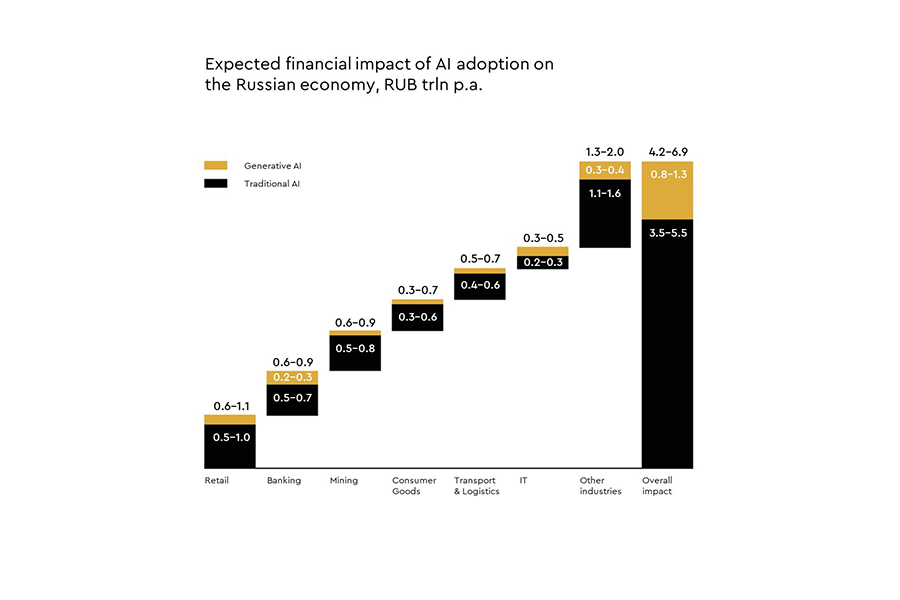As part of the study "Artificial Intelligence in Russia — 2023: Trends and Outlook", experts fr om Yakov & Partners and Yandex interviewed CTOs of Russia's major companies in 15 industries key to the Russian economy and analyzed trends in the development of artificial intelligence in the country and globally. The survey showed that today as many as 20% of respondent companies are already using generative AI for their needs in various business functions. Of these, 12% have already identified priority functions and use cases for generative AI deployment, and another third (about 27%) are experimenting with the technology on an ad hoc basis.
OpenAI solutions are used by 100% of surveyed companies (GPT-4, GPT-3.5). Additionally, 80% of respondents use YandexGPT for text processing tasks, and more than 40% use Kandinsky for image processing.
Marketing & Sales (66% of deployments), Customer Service (54%), Research & Development (49%), and IT (31%) are the areas wh ere generative AI is already being most commonly deployed. This is in line with the international trend.
Opening Russian generative neural networks APIs to companies will incentivize businesses to incorporate the technology into their user products and internal processes. Areas where the technology will yield the fastest results are IT, Marketing, and Customer Service: for example, a code writing assistant based on generative AI can boost developers' productivity and free them from 10 to 15% of routine tasks, and generative prompts and summarization of queries will enable support staff to process customer queries 30–40% faster.
Almost all surveyed companies (94%) cite cost reduction as the key benefit of introducing AI into business processes; about a third of companies in the consumer sector (Banking, Retail, Media, Telecom, E-Commerce, and IT) also expect AI to boost revenue, increase the value of products for customers and, as a result, improve customer loyalty.
Today, one in two surveyed companies in Russia is either experimenting with or using AI-powered solutions. Of those that have already started introducing AI into their processes, 68% note that it has had an approximately 1–5% impact on the company's EBITDA. As new tools become available, applications expand, and access to AI gets easier, we expect the impact to expand well beyond the current numbers. This is especially relevant as traditional sources of growth are being depleted.
The survey findings led experts to conclude that the economic potential of artificial intelligence in Russia will amount to RUB 22–36 trln by 2028. Six sectors key to the Russian economy — Transportation & Logistics, Banking, Retail, Mining, Consumer Goods, and IT — account for about 70% of the potential. The impact from the adoption of artificial intelligence may reach RUB 4.2–6.9 trln by 2028, which is equivalent to a GDP impact of up to 4%. Of this, generative AI will account for RUB 0.8–1.3 trln.
About ten countries in the world are developing their own foundation generative artificial intelligence models, including Russia, with our country ranking 7th in the world in terms of the level of government support for artificial intelligence development. This focus is not accidental — the adoption of artificial intelligence will have much broader consequences for the country than the direct economic impact, in particular, the development of artificial intelligence will have a positive effect on the quality and duration of life, improve the quality of education, and create new jobs.
For more than 60% of employees, the development of generative artificial intelligence will be more of a plus, as it will free up their time by automating routine tasks such as data collection, data entry and initial processing, routine document management, initial customer communications, accounting and many others. This will reduce time costs and allow employees to focus on more creative tasks. For Russia, this outlook is likely to be attractive; given the projected labor shortages in the medium- and high-skilled segments by 2030, improving employee productivity will help alleviate potential shortages.




